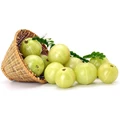
Kafal, also referred to as bayberry, is an evergreen tree native to the sub-tropical Himalayan region, spanning from India to Nepal, China, and beyond. Its scientific name, Myrica esculenta, underscores its edible fruit, which plays a pivotal role in local diets and traditional medicine. The tree's dioecious nature means that male and female flowers are borne on separate plants, contributing to its ecological diversity.
The fruits of Kafal are small drupes, characterized by a succulent pulp and a tough endocarp that protects the seeds. Ripening in late spring to early summer, these fruits range in color from deep crimson to almost purple when fully matured. Despite its local popularity and commercial value, Kafal remains predominantly sourced from wild populations due to limited cultivation efforts.
Nutritional Profile of Kafal (Bayberry):
One of the most compelling aspects of Kafal is its rich nutritional composition, making it not only a tasty treat but also a beneficial addition to the diet. Here's a detailed look at the key nutritional components found in Kafal:
-
Carbohydrates and Fiber: Kafal fruits are rich in carbohydrates, primarily in the form of natural sugars that contribute to its sweet taste. These sugars include glucose, fructose, and sucrose, providing a quick source of energy. Additionally, Kafal contains dietary fiber, which aids in digestion and contributes to a feeling of fullness after consumption.
-
Vitamins: The fruits are notably rich in Vitamin C (ascorbic acid), an essential nutrient known for its antioxidant properties. Vitamin C supports immune function, collagen production, and helps protect against oxidative stress. Studies have indicated varying levels of Vitamin C content in Kafal, typically ranging from 17.6 to 28.2 mg per 100 mL of pulp.
-
Minerals: Kafal fruits also contain a range of essential minerals such as potassium, calcium, manganese, copper, iron, and zinc. These minerals play crucial roles in various physiological processes, including bone health, immune function, and cellular metabolism.
-
Phytochemicals: Phytochemicals are bioactive compounds naturally present in plants, often contributing to their medicinal properties. Kafal is known to contain phenolic compounds, flavonoids, and other antioxidants. These phytochemicals exhibit anti-inflammatory, antimicrobial, and potentially anticancer properties, thereby enhancing the fruit's therapeutic potential.
Medicinal Uses and Health Benefits of Kafal (Bayberry)
Beyond its nutritional richness, Kafal holds a revered status in traditional medicine systems like Ayurveda and Yunani. Here are some of its traditional medicinal uses and associated health benefits:
-
Antioxidant Properties: The high content of antioxidants in Kafal fruits helps combat oxidative stress and neutralize free radicals in the body. This property is crucial in preventing cellular damage and reducing the risk of chronic diseases such as cardiovascular disorders and certain cancers.
-
Digestive Health: The dietary fiber in Kafal fruits supports digestive health by promoting regular bowel movements and preventing constipation. It also aids in maintaining a healthy gut microbiota, which is essential for overall digestive and immune function.
-
Anti-inflammatory Effects: Certain compounds found in Kafal, such as flavonoids and phenolics, exhibit potent anti-inflammatory effects. These properties can help alleviate symptoms of inflammatory conditions like arthritis and improve overall joint health.
-
Immune Support: Vitamin C, along with other antioxidants present in Kafal, boosts immune function by enhancing the production of white blood cells and antibodies. Regular consumption of Kafal fruits may help strengthen the immune system and protect against infections.
-
Cardiovascular Health: Potassium and other minerals in Kafal contribute to heart health by regulating blood pressure and supporting proper heart function. The antioxidants in the fruit also contribute to reducing oxidative stress on blood vessels, thereby lowering the risk of heart disease.
Culinary Uses and Cultural Significance
In addition to its medicinal prowess, Kafal holds a significant place in the culinary traditions of the Himalayan regions. The fruits are used to prepare a variety of delicious and nutritious dishes, including jams, syrups, squashes, and pickles. These culinary creations not only preserve the fruit's flavors but also extend its shelf life, allowing for year-round enjoyment of this seasonal delicacy.
Culturally, Kafal is intertwined with folklore and local customs, reflecting its deep-rooted importance in community rituals and celebrations. The Kafua bird, often associated with the fruit, adds a mystical allure to its story, resonating through oral traditions passed down through generations.
Conservation Challenges and Future Prospects
Despite its cultural and nutritional significance, Kafal faces several conservation challenges in the wild. Overharvesting, habitat loss due to urbanization, and inadequate cultivation efforts threaten the sustainability of wild Kafal populations. Efforts are needed to promote sustainable harvesting practices, initiate cultivation programs, and raise awareness about the importance of conserving this valuable species.
Looking ahead, there is immense potential for Kafal to contribute to global health and nutrition initiatives. Its rich nutritional profile, coupled with its diverse medicinal uses, positions it as a valuable candidate for further scientific research and development. By harnessing its natural benefits responsibly, we can ensure that future generations continue to benefit from this Himalayan treasure.











